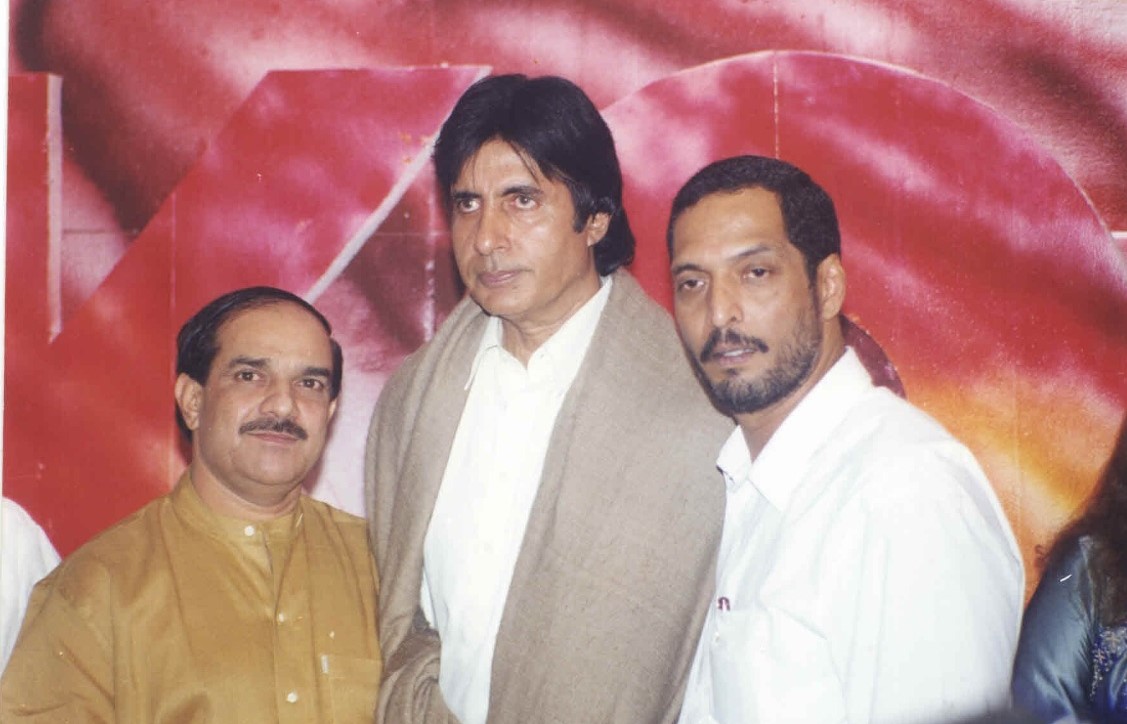

Baloch director Mehul Kumar with Amitabh Bacchan and Nana Patekar
It is said if you want to understand a country or nation, look at its culture and you will come to know its story. Even in the age of globalization, culture supports and promotes one’s national identity. But if your identity is crushed and you feel alienated, what will you celebrate?
On March 2 every year Balochistan celebrates its cultural day.
Pakistan colonised Balochistan on 27 March 1948 and since then it has enforced its governments and decisions on the Baloch community. Pakistan has unleashed numerous atrocities on the Baloch through enforced disappearances, by using death squads and assassinating vocal Baloch voices outside the country.
I came across two short movies on the issue of enforced disappearances and their after effects.
Movie, ‘The line of Freedom’ is based on a true story showing Pakistan’s ‘Kill and Dump Policy’. The movie stars British Actor Antonio Aakeel and was filmed in the Middle East. The movie garnered praise at Dubai International Film Festival but Pakistan banned the movie and threats were issued to the film’s team.
Mama Qadeer from the research organisation, the Voice for Baloch Missing Persons (VBMP) states in a 2019 report by the Human Rights Commission of Pakistan (HRCP) titled ‘Balochistan: Neglected Still’ that nearly 47,000 Baloch are missing.
The second short movie I came across was ‘Bloody Words’, written and directed by Baloch National Movement (BNM) UK Zone member Hakeem Baloch, which shows the physiological effects on exiled journalists who try to uncover the truth of Baloch missing persons and live in fear of being killed for doing their journalistic work.
The film is dedicated to exiled journalists and political dissidents like Sajid Hussain who went missing and later was mysteriously found dead in Sweden in 2020 and activist Karima Baloch who was found dead in Canada in December 2020.
Films are one of the best ways to showcase any issue, as the audio-visual medium directly impacts a person’s heart and mind, especially when you make films on real human tragedy. Last year, film director Vivek Agnihotri shook up the world with ‘The Kashmir Files’, which depicted how Kashmiri Hindus faced genocide at the hands of Pakistan-sponsored Islamist terrorists.
Balochistan has been in the limelight in India since 2016 after PM Modi’s speech at the Red Fort and has become the premise or sub-plots of several Bollywood OTTs like Emraan Hashmi’s Bard of Blood and Manoj Bajpayee’s The Family Man which are primarily spy thrillers.
It is high time filmmakers from around the world, specially India, make films and series on Balochistan so that this issue in our neighbourhood gets highlighted. Moreover, Indian history is deeply connected to Baloch history as this restive region is part of the Indian subcontinent. This year a Marathi movie ‘Baloch’ is slated to release which will showcase how after the defeat of Maratha forces in the Third Battle of Panipat Maratha POWs were taken to Balochistan as slaves.
Following is a true story – of a new community of ‘Bugti Marathas’ who trace their ancestry to Maratha soldiers and how they were freed from slavery by Nawab Akbar Khan Bugti in 1992.
India Narrative speaks with Mehul Kumar aka Mohammad Baloch, who has given iconic films like Kohram, Krantiveer, Tirangaa, Jagoo etc. Mehul Kumar says “films are the mirror of society, so whatever happens in society, filmmakers try to show that in a cinematic way. There are a lot of movies which are based on true events and society has accepted and even taken learning. Films should have stories which should tell happenings around us. Movies which I made continue to be relatable by the audiences even today”.
Mehul Kumar adds that “Balochistan has the potential to become a developed country as it has tremendous natural resources but Pakistan doesn’t want it to develop. Makers in India should become aware of the realities of Balochistan and how she is yearning for freedom. Even Prime Minister Modi has raised the issue of Balochistan, I truly believe that Bollywood should make movies on Balochistan.”
As India enters into the Amrit Kaal, India not only will be an important player in geopolitics but will also take over challenges and responsibilities for the same. And if not politically, at least India should culturally support Balochistan and highlight the atrocities committed by Pakistan.
This is India’s moral responsibility from its pre-Partition times.
Also Read: Walking on Kashmir Files trail, filmmaker Vivek Agnihotri discovers Balochistan
The Government of Myanmar has expressed deep gratitude for India's swift and substantial support in…
Protesters affected by the Diamer-Bhasha Dam project offered Eid-ul-Fitr prayers at their ongoing protest camp…
External Affairs Minister S. Jaishankar recognised the screening of 'The Diplomat' in Israel for a…
By Rajnish Singh Operation Brahma by India is operating at full tilt aimed towards providing…
Indian Naval Ship (INS) Tarkash successfully intercepted and seized over 2500 kg of narcotics in…
The Rajasthan Samagra Kalyan Sansthan (RSKS India) made a significant impact during the 58th session…